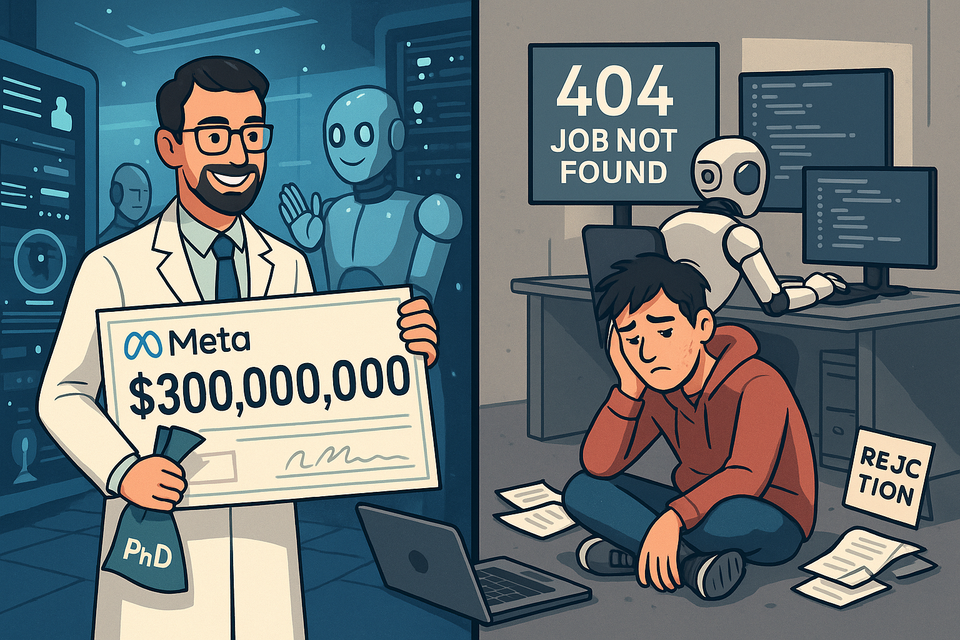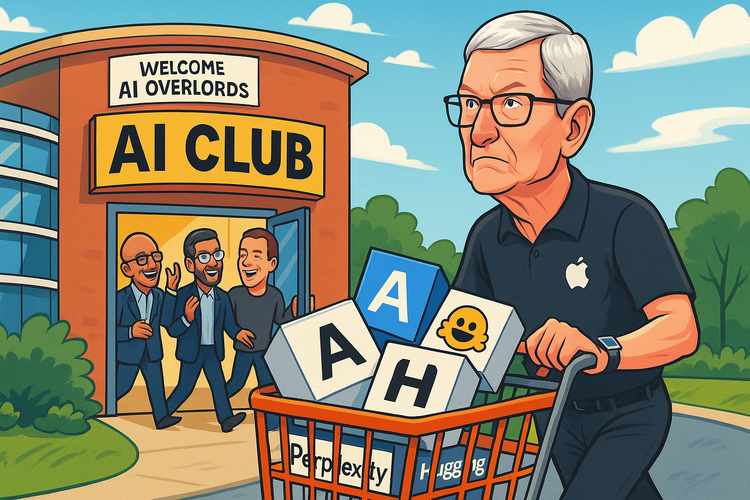AI's Great Divide: Why Meta Is Paying $300M for PhDs—While Juniors Can’t Even Get a Phone Screen

Summary
Big Tech’s AI arms race has created two very different job markets. Elite researchers are getting $200M+ offers from Meta and co. Meanwhile, junior engineers can’t even get an interview. Here's why this is happening—and what it means for the future of work.
Introduction: Welcome to the AI Barbell Economy
Imagine two engineers. One just got a $250 million offer from Meta. The other just got rejected by a chatbot after applying to 134 jobs.
Both are real. Both are working in AI.
This is not a job market—this is a stratification machine. In 2025, we’re seeing a historic split: an elite class of AI researchers commanding CEO-level packages, and everyone else, especially entry-level software engineers, watching hiring pipelines vanish.
Let’s walk through what’s really going on.
1. Apple Isn't Poaching—It’s Bleeding
Despite rumors that Apple was luring AI stars with $10M offers, the reality is far more ironic: Apple is losing top AI talent to Meta.
- Head of Foundation Models, Ruoming Pang, was poached by Meta with a reported package over $200M.
- Pang’s key team members followed—Meta also snapped up Mark Lee and Tom Gunter, gutting Apple’s internal LLM team.
- Apple reportedly offered retention bonuses to 100+ engineers just to stop the bleeding.
Meanwhile, Apple is exploring replacing its own LLMs with external models like Claude or ChatGPT to power Siri.
Meta-comment: If you’re building a $3T company and still considering “renting” your AI, something’s off.
2. Meta’s Billion-Dollar Superteam Strategy
While everyone else was laying off engineers, Meta decided to build the Avengers of AI.
- Meta offered $200–300 million over four years to top-tier AI talent.
- They’ve recruited Alexandr Wang, Nat Friedman, and Daniel Gross—effectively acquiring brains instead of startups.
- OpenAI’s Sam Altman called it “insane,” which probably means it’s working.
"The typical offer for the folks being poached... is $200 million over 4 years. That is 100x that of their peers."
That’s not a talent war. That’s a compensation coup.
3. The Entry-Level Ice Age
Now the flip side. While Meta is launching golden parachutes, junior engineers are falling without a net.
- Software job postings are down 35% vs. 2020.
- Programming employment is at its lowest since 1980.
- Entry-level hires? Only 2.5% of AI roles are open to new grads.
- Salesforce and Microsoft now say AI writes 30%+ of their code.
"Junior engineers have a little bit of a target behind them."
Which is polite-speak for: They’re expendable now.
If you’re just out of school with a CS degree, good luck. Unless you also have a PhD, 2 YOE, Kaggle trophies, and maybe a podcast.
4. Trumpism: Tough on Visas, Soft on Billionaires
Trump’s AI hiring stance isn’t a total shutdown, but it’s no open door either.
- He supports H-1B visas—but only for high-wage roles.
- Proposed changes prioritize wage-based selection and restrict vague “specialty occupation” claims.
- Tech CEOs are nervous. Companies like Google and Amazon are advising H-1Bs not to travel abroad.
Quote-worthy: “77% of top U.S. AI companies were founded or co-founded by immigrants.”
So if immigration slows down, America’s AI dominance could too.
5. The Numbers Don’t Lie: It’s a Barbell
- AI research roles: +22% growth
- Data science: +36% growth
- ML engineers: +74% growth over 3 years
- Entry-level tech jobs: down 50%+ since 2019
And compensation?
- OpenAI researchers: $10M+ annually
- Entry-level applicants: 2% phone screen rate
"We’re going from mass hiring to precision hiring."
This is no longer a pyramid. It’s a barbell. Heavy hiring at the top, nothing in the middle, and light (or zero) at the bottom.
So What Now?
If you're a developer:
- Learn to build or leverage LLMs.
- Specialize in niche + AI (think: AI + law, AI + bio, AI + policy).
- Accept that vanilla SWE is becoming commoditized.
If you're a company:
- Compete for elite AI talent—or figure out how to use their tools better than your competitors.
If you're a policymaker:
- Treat AI talent like rare earth metals: strategic, scarce, and not easily replaceable.
Takeaways
- Meta is reshaping tech hiring by paying superstar AI talent CEO-level packages.
- Apple is quietly falling behind—and may outsource Siri’s brain.
- Junior engineers face the worst market in a generation.
- Trump's visa policy may target wage thresholds, not outright bans, but fear is spreading.
- The future of tech work is not evenly distributed—it’s being concentrated at the very top.
Sources
- Meta poached Apple’s top AI exec with $200M+ offer – Bloomberg
- Meta hires two more Apple AI researchers – Bloomberg
- Meta expands its AI team by hiring from Apple – Lapaas
- Apple considers using OpenAI or Anthropic models for Siri – Bloomberg
- Apple AI morale drops amid Meta poaching spree – Fortune
- Meta offers $300M to top AI talent – Wired
- Meta hires Safe Superintelligence CEO Daniel Gross – CNBC
- Inside Meta’s AI Superintelligence plans – SemiAnalysis
- The battle for AI talent – Smythos
- Google DeepMind hit by AI talent exodus – Horizon
- Software engineering job postings collapse – BlackTechJobs
- 2025 State of Talent Report – SignalFire
- AI engineer job outlook 2025 – 365DataScience
- Tech hiring trends in 2025 – Become Irreplaceable
- Programming jobs hit 1980s low – Fortune
- Software engineer demand declining – Business Insider
- Trump speaks on H-1B visas – BBC
- Trump proposes wage-based H-1B reform – Forbes
- What Trump’s immigration stance means for tech – Employment Law Worldview
- Tech employers face H-1B restrictions – Fisher Phillips
- Trump immigration test reforms – NYT
- H-1B reentry concerns raised in Congress – Congress.gov
- Google, Amazon advise H-1Bs not to travel – NDTV
- Immigration enforcement policies – Jackson Lewis
- 77% of top AI companies founded by immigrants – Forbes
- Immigration policies could threaten AI leadership – Brookings
- Perplexity founder on H-1B and layoffs – Economic Times
- AI scientist vs. ML engineer roles – AIJobs.net
- BLS data scientist outlook – BLS.gov
- AI hiring trends and salaries – PatentPC
- OpenAI, Google, xAI talent wars – Reuters
- 2025 AI tech layoffs overview – Forbes



